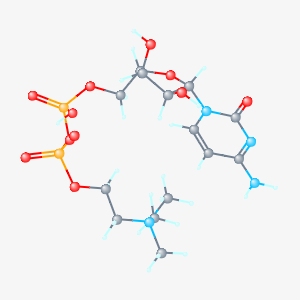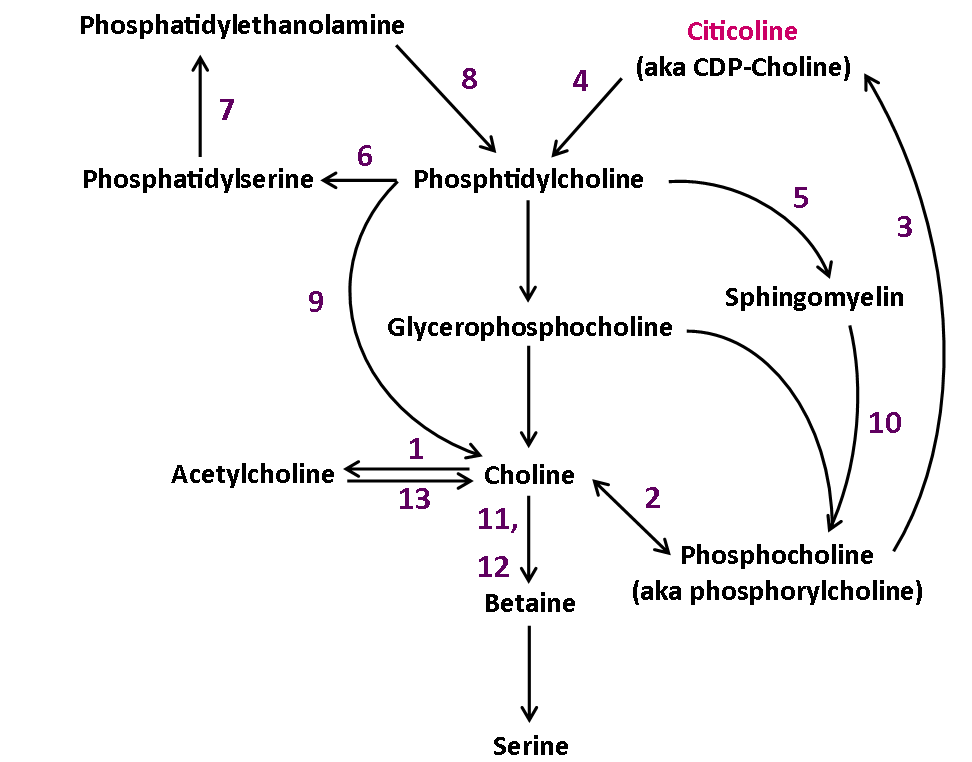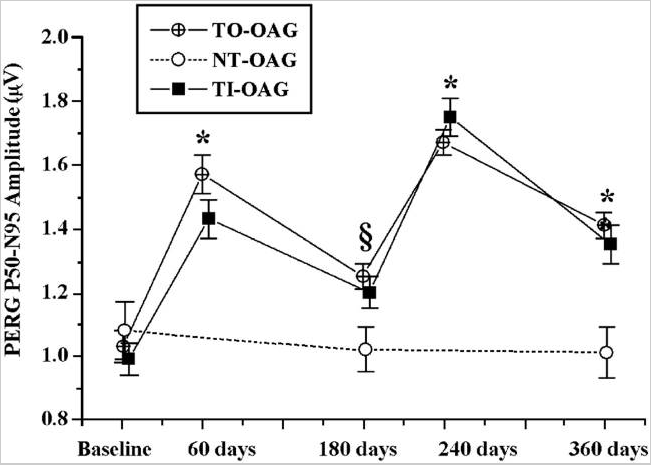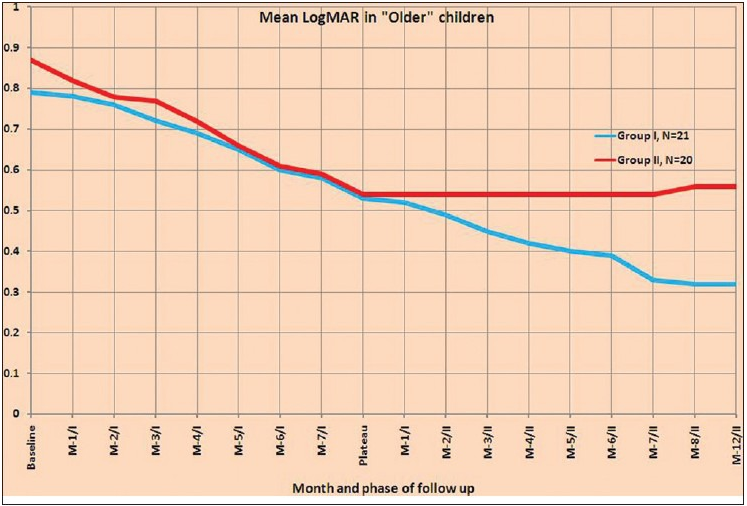Naturally-occurring citicoline may help combat the development of neurodegenerative eye disorders.

Citicoline is an intermediate in the generation of phosphatidylcholine and is believed to help improve eye health by:
- Promoting neuroprotection. Citicoline has displayed a capacity to protect retinal cells by enhancing the synthesis of phospholipids.
- Triggering dopamine release. Dopamine is critical for effective retinal signaling.
Overview
Citicoline (CDP choline, cytidine diphosphate-choline) is an intermediary in the synthesis of phosphatidylcholine, which is a critical component of healthy cell membranes. As a naturally-occurring compound, citicoline is vital to the well-being of cells and is particularly renowned for its potential to enhance cognitive function.
Its use as a supplement has been linked to a plethora of nootropic effects:
- Improving brain energy utilization
- Repairing brain cell membranes
- Protecting brain cells from injury
- Boosting neurotransmitter production
- Regulating brain circulation
Alongside its nootropic properties, citicoline’s critical part in the production and maintenance of cell membranes has also been shown to benefit eye health and even improve visual function.

How Citicoline Might Help With Vision
Neuroprotection
Citicoline has repeatedly been shown to be capable of protecting neuronal cells, including retinal cells essential for vision, from injury and degeneration.1 Though the precise mechanism behind its neuroprotective activity is still being investigated, key steps in the process have been proposed:2
- Preserving structural components of cell membranes, specifically cardiolipin and sphingomyelin
- Regulating the amount of arachidonic acid, which is critical for brain health
- Increasing levels of phosphatidylcholine
- Stimulating the synthesis of the antioxidant glutathione
- Attenuating lipid peroxidation, a form of oxidative stress
- Stabilizing ion levels by restoring Na+/K+ ATPase activity
Increasing dopamine levels
Furthermore, citicoline has demonstrated a capacity to stimulate neurotransmitters, i.e., dopamine, which plays a critical role in visual pathways.3
Citicoline Benefits & Uses for Vision
Citicoline has widely been discussed and even implemented as a potential treatment for various eye conditions, particularly glaucoma and amblyopia, which often result as a consequence of neurodegeneration.4 Its success as a medical drug to improve eye health for 5 decades has led to its use in recent years as a natural supplement to counteract the development of vision loss before it even gets started.5 One such supplement, Cognizin, has been touted as ranking among the upper echelon of citicoline variations due to its patenting, stability, and clinical backing.

Research
Animal Research
Animal research indicates that citicoline may benefit vision by:
- Reducing the progression of myopia in guinea pigs7
- Supporting neuroprotection in rat retinal cells8 9
Human Research
Clinical studies have overwhelmingly reported that citicoline may be a viable treatment for improving the vision of people affected by various eye conditions.
Citicoline (1000 mg) may improve visual signaling in glaucoma patients
In this clinical investigation, 11 glaucoma patients were given 500 milligrams of citicoline twice daily for 2 periods of 14 days. The visual evoked potentials (VEP) were significantly improved based on reduced latency and increased amplitude after treatment.
- The researchers concluded that “citicoline treatment normalizes VEPs in glaucoma patients.”10
Citicoline (1600 mg) may improve retinal function in patients with glaucoma
In this clinical investigation, glaucoma patients were given citicoline either orally at 1600 mg or intramuscularly at 1000 mg everyday for 2 periods lasting 60 days each. Retinal function and neural conduction were reported to have improved in both groups.
- The researchers concluded that “these results suggest potential neuroprotective effects of citicoline in the glaucomatous disease.”11
Citicoline (1000 mg) may improve visual acuity in patients with amblyopia
In this randomized, double-blind, placebo-controlled investigation, 50 patients with amblyopia were given 1000 mg of intramuscular citicoline or a placebo every day for 6 months. Visual acuity was significantly improved in the citicoline group compared to the placebo, and no adverse side effects were observed.
- The researchers concluded that “citicoline improves visual acuity, at least temporarily, in amblyopic patients.”12
Citicoline (1000 mg) may improve visual function in patients with glaucoma
In this randomized, placebo-controlled investigation, 40 patients with open angle glaucoma were given either a placebo or 1000 mg of intramuscular citicoline every day for 2 periods of 60 days. Citicoline treatment induced significant improvements in visual evoked potential (VEP) and pattern-electroretinograms (PERGs) compared to the placebo, with further improvements noted after the second round of treatment.
- The researchers concluded that “citicoline may induce an improvement of the retinal and of the visual pathway function in patients with glaucoma.”13
In this investigation, 10 patients with amblyopia were given 1000 mg of intramuscular Neuroton® citicoline every day for 15 days. On average, treatment improved visual acuity (VA), contrast sensitivity (CS), and visual evoked potentials (VEPs) in both normal and amblyopic eyes.
- The researchers concluded that “treating adult amblyopes with CDP-choline has the effect of improving their VA, CS and VEPs.”14
Citicoline (3 drops) may improve retinal responses in patients with open angle glaucoma
In this placebo-controlled investigation, 56 patients with open angle glaucoma (OAG) were treated with either 3 drops of OMK1® topical citicoline or a beta-blocker control every day for 4 months. The citicoline group was shown to have a significant increase in pattern electroretinogram (PERG) amplitudes and decrease in visual evoked potentials (VEP) latency compared to the control, which suggests improvements in vision.
- The researchers concluded that “citicoline in OAG eyes induces an enhancement of the retinal bioelectrical responses… [and] improvement of the bioelectrical activity of the visual cortex.”15
Citicoline (500 mg) may improve visual acuity and enhance occlusion in patients with amblyopia
In this clinical study, 45 children with amblyopia between the ages of 5 to 9 years were treated with 500 mg of citicoline, the same amount of citicoline in conjunction with occlusion, or just occlusion every day for 10 days. The trial was repeated again after 6 months. Citicoline was found to improve overall visual acuity and enhance occlusion treatment.
- The researchers concluded that “CDP-choline enhances the effect of part-time occlusion.”16
Citicoline (250, 500 mg) may help improve visual acuity when combined with patching
In this randomized, controlled trial, 84 patients with amblyopia between the ages of 4 to 13 years were treated with either patching alone or patching with citicoline (250 mg for patients under 5 years and 500 for those over 5 years) every day for 6 months. Significantly greater improvement in visual acuity was reported in patients treated with both citicoline and patching than patching alone.
- The researchers concluded that “improvement in visual acuity with citicoline plus patching was significantly more than that with patching alone.”17

Dosage for Vision
- Successful clinical research studies have used from 250 – 1600 mg of citicoline per day.
- Typical citicoline supplement daily servings range from 250 – 2000 mg.
Available Forms
- Tablets, capsules, and softgels
- Intramuscular injection
- Eye drops
Supplements in Review Says
- Citicoline 250 – 500 mg for vision.
Citicoline seems to be an excellent vision supplement. We highly recommend citicoline as a vision enhancer to reduce the risk of developing as well as combat current neurodegenerative eye conditions. No serious adverse side effects or drug interactions have been reported.
Try patented citicoline supplements with scientific backing. Years of medical use have produced many varieties of citicoline treatments. We recommend starting with a patented and clinically supported pill, such as Cognizin®, at 250 – 500 mg per day.
Leave a Reply